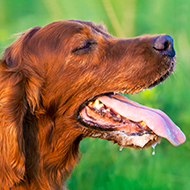
New research shows heat-related illnesses are likely to become more common.
Heat-related illness in companion animals is likely to become more common as global temperatures rise, according to new research.
The study by Nottingham Trent University looked at heat-related illness (HRI) in small animals presented to veterinary practices between 2013 and 2018.
Researchers say their findings highlight the need for greater awareness of HRI, and support previous claims that exercise is the most common trigger in dogs. The findings are published in the Open Veterinary Journal.
In the study, researchers found that dogs were the worst affected species, with 146 cases of HRI. Of these, 74 per cent of cases were attributed to dogs being exercised, while seven per cent were related to dogs being locked inside a hot cat.
Environmental HI was reported as a trigger for the remaining dogs, and all the cats, guinea pigs, rabbits and a single ferret. Brachycephalic animals were found to be particularly affected by HRI; 21 per cent of all canine cases and 100 per cent of rabbits included in the study were flat-faced breeds.
Unsurprisingly 45 per cent of canine HRI cases were reported during July. Cats with HRI were presented between May and September, with 75 per cent during June and July.
The smaller companion species—ferrets, rabbits and guinea pigs—were presented during the UK’s summer months June to August.
Study author Dr Emily Hall from Nottingham Trent University, said: “Heat-related illness can affect all pets and is likely to become more common as global temperatures rise. Our findings highlight the need for better public awareness of heatstroke and the risk to all animals.
“The fact that brachycephalic dogs and rabbits were overrepresented in our study suggests that owners of these animals should be particularly vigilant during hot weather.”
The study used data from veterinary practices that participate in the University of Liverpool's ‘Small Animal Veterinary Surveillance Network’ (SAVSNET).



 The Veterinary Medicines Directorate (VMD) is inviting applications from veterinary students to attend a one-week extramural studies (EMS) placement in July 2026.
The Veterinary Medicines Directorate (VMD) is inviting applications from veterinary students to attend a one-week extramural studies (EMS) placement in July 2026.